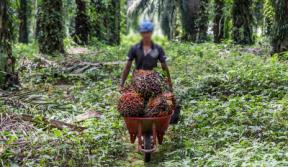PepsiCo Inc., the world’s second-largest food and beverage company, has announced the adoption of a comprehensive palm oil sourcing policy and committed to a broad set of actions aimed at ensuring the palm oil in its supply chain will not contain deforestation, peatland destruction, or human and labor rights abuses. PepsiCo’s shift on palm oil is the result of a six-years long public campaign and positions it as a front runner amongst its peers, signaling to the industry that responsible palm oil production must be achieved. “We commend PepsiCo for adopting a comprehensive policy and leading actions that, if implemented, will drive change in its palm oil supply chain as well as the broader palm oil industry,” said Robin Averbeck, Agribusiness Campaign Director with Rainforest Action Network (RAN), who worked with PepsiCo on updating its policy. The policy applies to PepsiCo’s entire supply chain, from direct suppliers to production sources, including all palm and palm kernel oil that it uses globally. Two key reforms are that the policy now applies to suppliers at the group level, meaning it will apply across the entire operations and third-party supply chains of suppliers, not just the palm oil sold directly to PepsiCo, and it serves as an expectation of doing business with PepsiCo for its business partners at a group level. This includes Indofood, the largest food processing company in Indonesia with which PepsiCo owns a joint venture company to make its snack food products in Indonesia, and Indofood’s parent company the Salim Group. Indofood and the Salim Group have significant palm oil holdings and operations across Indonesia, on which labor exploitation, legal violations, and peatland clearance have been documented. Additionally, PepsiCo has committed to improved human rights provisions and to play a more proactive role in the palm oil industry, including taking actions to address ongoing deforestation in Indonesia’s critical Leuser Ecosystem. PepsiCo’s policy and promised actions on its palm oil supply chain were developed with Rainforest Action Network (RAN), Indonesian labor rights organization OPPUK, and International Labor Rights Forum (ILRF), whose Conflict Palm Oil campaign has brought much-needed attention to deforestation and labor rights abuses rife in the palm oil industry. “The reality of the global climate crisis is becoming clear and island nations like Indonesia have been experiencing the first and worst impacts,” said Herwin Nasution, Executive Director with Indonesian labor rights organization OPPUK. “While Conflict Palm Oil has been contributing to the destruction of our forests and our climate, it has also been harming palm oil workers on plantations across Indonesia. For these palm oil workers, we applaud this commitment from PepsiCo and we will watch to see it turn into real action on the ground.” “As we face the critical year of 2020, paper promises need to be turned into action on the ground for workers and the environment,” said Judy Gearhart, Executive Director with International Labor Rights Forum (ILRF). “PepsiCo and other multinational corporations which have pledged to eradicate forced labor, human rights abuses, and deforestation from supply chains have no time to waste.” Over the course of its campaign, RAN encouraged its supporters to take action against the snack food company through peaceful protest both online and offline. Over 100,000 people signed petitions, called and emailed the company, and took action to raise awareness in their communities. RAN and its allies have negotiated palm oil policies from some of the largest consumer goods manufacturing companies in the world and have created a shift in the palm oil industry, setting expectations that palm oil must be produced without deforestation, destruction of peatlands and human rights abuses.

